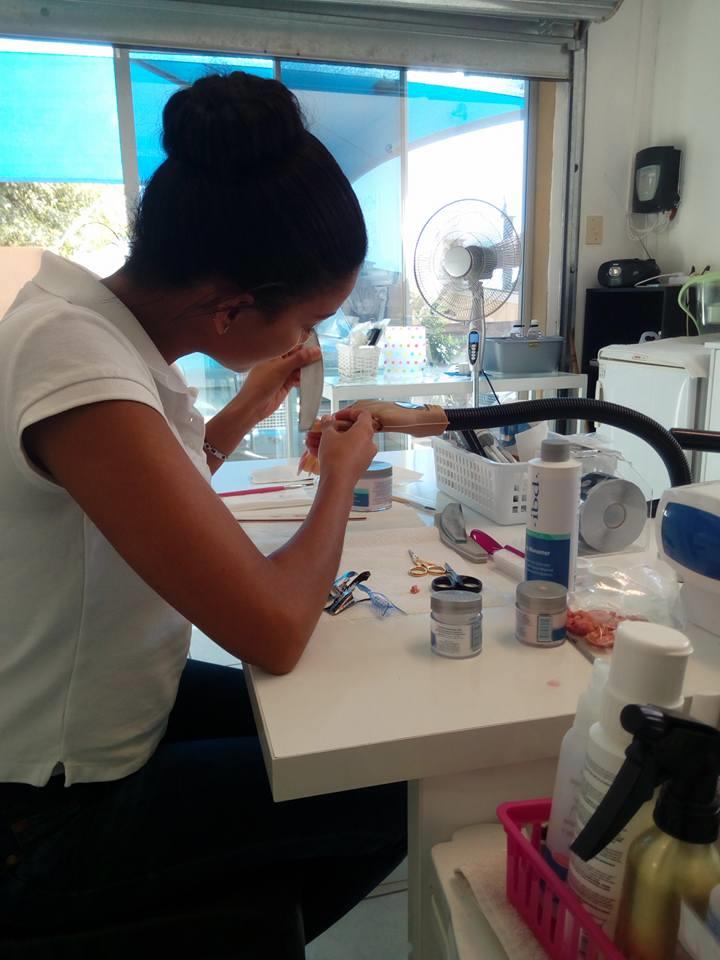It’s not over yet!
After completing your grade 12 and receiving your results, you realise you do not qualify for entry into tertiary institutions. However, there are many options one can look at to secure a future. The Zone spoke to a few entrepreneurs and institutions to find out how this is possible.
offers a variety of different classes targeted at both beginners and qualified nail technicians. For beginners, classes are taught in alignment with the modules of the NailArtiste programme during two weeks of each month, and various advanced skill-building classes for qualified techs, which take place one week of each month. “The remaining week of the month, I dedicate to providing services to my amazing and loyal salon clients,” she says.The cost of the classes vary, depending on the kit requirements and the skills being taught. The short advanced skill-building classes start from N$350 per person for a four-hour session, without any kit included. For most of these classes Gunning provides the materials that students need to participate, and they purchase what they need afterwards. Some of the advanced classes such as the electric filing course may need more than one four-hour session and does cost a bit more.
Beginners’ training costs a lot more due to the extra time and materials needed. The training packages Gunning offers starts from N$5 000, which includes live tuition and international certification fees only. Product kits that students need to complete their coursework and case studies are purchased separately as students work through their programme. The average total spend on tuition, products and equipment for the full programme is between N$13 000 and N$18 000, spread over the timespan of one year. Various payment plans are available to make quality education more accessible to those who can’t afford to pay the full price all in one go.
The Nail Lady believes that vocational learning skills are very helpful for those learners whose points don’t allow them university entrance. “People often forget that not everyone is wired the same way, and therefore not everyone is likely suited to follow a career that requires a university degree,” she says. “Following a good vocational education programme is a fantastic option for school leavers because it equips them with marketable practical skills that will allow them to follow a successful career,” she further says.
NailArtiste is the only school in Namibia that specialises exclusively in nail technology education. Between Gunning and two regional instructors, based in Windhoek, Walvis Bay and Ongwediva, they facilitate an internationally recognised programme that follows the North American Standard Nail Technology curriculum, alongside the brand specific education for artistic nail design.
Students who complete the programme earn an international diploma and a professional designation that are accepted in several countries around the world.
“Once students have completed the diploma programme with us, they can continue their studies to become qualified as medical nail technicians who offer specialised services and treatments, or with an additional educator’s qualification, they may also choose to become teachers,” Gunning says.
Students who complete the programme have the opportunity to become employed as salon professionals, or they may choose to operate their own nail studios.
The house of glam
Melvy Macky and Tia Gawases are siblings who are make-up and hair gurus. They will be offering their first-ever classes, which will be held every two months in the capital. They will offer them at various towns in the near future.
Macky’s hair and make-up interest started back in 2015, when Macky was a student at the International University of Management (IUM). “I always did my hair and make-up every day and people would ask ‘who did your make-up and hair?’ And I thought, I can actually make money out of this,” Macky said.
The make-up training course will cost N$1 500 and wig-making training costs N$2 500. Both make-up and wig courses come with a start-up kit. All basic essentials are provided.
Macky strongly agrees that offering these short courses are helpful, because it enables you to start your own business and become your own boss. “It will help you master your craft; every day is an opportunity to learn something new,” Macky said.
Macky said every woman loves looking beautiful and the courses will help them to enhance their natural beauty and make them knowledgeable about different make-up products can be used for oily skin and to cover acne scars etc.
Gawases’ passion for beauty started when she was a little girl. “When I moved to Windhoek for school purposes, I never got pocket money from my parents, so I decided to start doing hair and make-up and started advertising my work on all social media platforms,” she said.
“The courses will also help you to provide for yourself and your family financially, and are a great starting point, resulting in not just being home,” Gawases added.
La Golden Bakery
Julia Shipindo has been in the baking business for approximately two years. She was a self-taught baker for six months, until she attended training in South Africa to further enhance her skills and mingle with other pastry chefs.
Shipindo started baking because of her children. “My son loves cakes and when we pass by the shops, he would cries for cakes,” she said.
La Golden Bakery offers classes two days per month and accommodates four students per session. Shipindo said the full course, which consists of baking, executing a three-tier demo wedding cake and all modes of decorating, is N$3 800.
The trainees learn how to bake cakes and the discipline behind measuring of all ingredients. They learn how to price cakes, draw on a cake as well and how to communicate with customers.
Shipindo believes that the course is of help if baking is something that you want to do full-time, especially if you have want to kill time and be occupied.
“Most of the bakers out there in the industry have a day-to-day job and bake over the weekends or at 17:00, once they knock-off,” she said.
Shipindo said it is a good way of generating an income.
The only secret behind it is to be good at it and have passion for it. “Without any good work no customers will come. The trainees who join the classes gain knowledge and can also be benefit financially.”
A journey into IT
Founded in 2012, the National Software Engineering Academy is a Namibian-owned private education institution that provides different courses in the fields of information technology (IT), business and commerce and linguistics.
Paulus Kalenga, representative of the academy, tells The Zone that admission for a certificate requires a learner to have completed grade 10 with 20 points and an E symbol in English, or a learner having completed grade 12 with 18 points and E symbol in English.
“For our diplomas courses, there are various requirements such as being in possession of a certificate from an accredited institution or grade 12 with 22 points minimum and an E symbol in English,” he says.
“In the case of candidates who do not meet the above requirements, the executive committee, or the managing director may interview the candidate for admission. Prior learning may be considered in this case.”
According to Kalenga, there are various benefits from studying IT courses. “The digital age needs computer scientists and IT specialists. They are needed in every type of industry and computer science students and IT specialists gain practical skills which they can use in their daily life,” he says.
The academy also offers short linguistic courses in Rukwangali, Oshindonga, Otjiherero and Rumanyo and international languages such as German, French and Portuguese.
“Learners who are labelled as failures should not give up on their dreams as there are many options available for them at our institution. These options allow students with low points in grade 10 and grade 12 to enrol for our certificate and diploma programmes,” advised Kalenga.
“These courses allow the students to learn further up to degree level, even up to masters and eventually PHDs. We have carefully crafted these courses with students with low points in mind, to take them from grassroots to high levels. So be informed that getting low points in grade 12 is not the end; enrol with our institution to learn, grow and become employable.”
Developing youth skills
Koesha Martin, business development and marketing manager of the Community Skills Development Foundation (Cosdef) in Swakopmund spoke to The Zone about the different options available to youth.
Established in 1997 and registered in 2016, Cosdef's mission is to assist communities to address training needs such as technical, vocational, business, entrepreneurial and workplace essential skills.
“The Cosdefs offer vocational training and community-based skills development courses and programmes to out-of-school youth and rural communities,” says Martin.
These vocational courses include a national vocational certificate in beauty services (levels 1 and 2, hairdressing, a national vocational certificate in business services (levels 1 and 2, office administration), a national vocational certificate in clothing production (levels 1 and 2, domestic & industrial), a national vocational certificate in information communication technology (level 1, computing fundamentals) and many more.
“Since there is such a great demand for the NQF (Namibia Qualifications Framework) courses, the minimum requirement is a grade 10, irrespective of the number of points earned. For the ones interested in doing the community-based short courses, there is no requirement and it works on a first come, first serve basis,” she tells The Zone.
The fees range from N$1 296 to N$2 160.
“Technical and vocational education and training (TVET) equips young people with skills that enable them to engage in productive livelihoods and it is a known fact that entrepreneurial skills augment the technical knowledge and skills young people gain in formal vocational training. Entrepreneurial skills will help them to acquire the mindset and know-how necessary to make self-employment a viable career option,” Martin adds.












Comments
My Zone
No comments have been left on this article